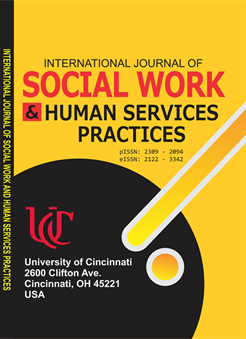INTERNATIONAL JOURNAL OF SOCIAL WORK AND HUMAN SERVICES PRACTICES (IJSWHSP)
SOCIAL WORK STUDENTS USE OF ADAPTED MINDFULNESS-BASED STRESS REDUCTION AS A STRESS MANAGEMENT STRATEGY
E-ISSN: 2122-3342
P-ISSN: 2309-2094
DOI: https://iigdpublishers.com/article/295
Stress management programs are not available or required in many social work programs and the need for programming is apparent considering NASW‟s self-care mandate and COVID-19 pandemic related student impacts. Using a convergent mixed methods design, the authors investigated the effects of an adapted mindfulness-based stress reduction course as a stress management strategy for social work students (n=15) during the COVID-19 pandemic to determine if there are any effects on students' level of stress and mindful self-care behaviors. Three, five-week courses consisting of synchronous meetings and asynchronous practice materials were conducted. The Perceived Stress Scale and Mindful Self-Care Scale were administered to students as pre-test and post-test to and a focus group was conducted at the conclusion of each's course's final week. Three themes emerged: commitment and routine, practice and techniques, and accountability and Wilcoxon signed ranks test results showed no significant effects of adapted mindfulness on students‟ perceived stress (z= -.882, p=.378). However, mindful relaxation (z = - 3.04, p=.002), and students‟ self-compassion and purpose (z = -2.62, p=.009), and mindful awareness (z = -1.93, p=.054) increased. Although stress levels were not significantly affected, students‟ self-care improved, which aligns with NASW code of ethics mandating professionalism through self-care.
April C. Bowie-Viverette
Ariel, A. B., Tamara, J. C., & Peter, M. (2015). Reflections on a quantitative, group-based mindfulness study with social work students. Social Work with Groups, 38(2), 93–105. https://doi.org/10.1080/01609513.2014.975885
Barak, M. E. M., Nissly, J. A., & Levin, A. (2001). Antecedents to retention and turnover among child welfare, social work, and other human service employees: What can we learn from the past research? A review and meta-analysis. Social Service Review, 75, 625-661.
Beiter, R., Nash, R., McCrady, M., Rhoades, D., Linscomb, M., Clarahan, M., & Sammut, S. (2015). The prevalence and correlates of depression, anxiety, and stress in a sample of college students. Journal of Affective Disorders, 173, 90–96. https://doi.org/10.1016/j.jad.2014.10.054
Bonifas, R. P., & Napoli, M. (2014). Mindfully increasing quality of life: A promising curriculum for MSW students. Social Work Education, 33(4), 469–484. https://doi.org/10.1080/02615479.2013.838215
Charles, N. E., Strong, S. J., Burns, L. C., Bullerjahn, M. R., & Serafine, K. M. (2021). Increased mood disorder symptoms, perceived stress, and alcohol use among college students during the Covid-19 pandemic. Psychiatry Research, 296. https://doi.org/10.1016/j.psychres.2021.113706
